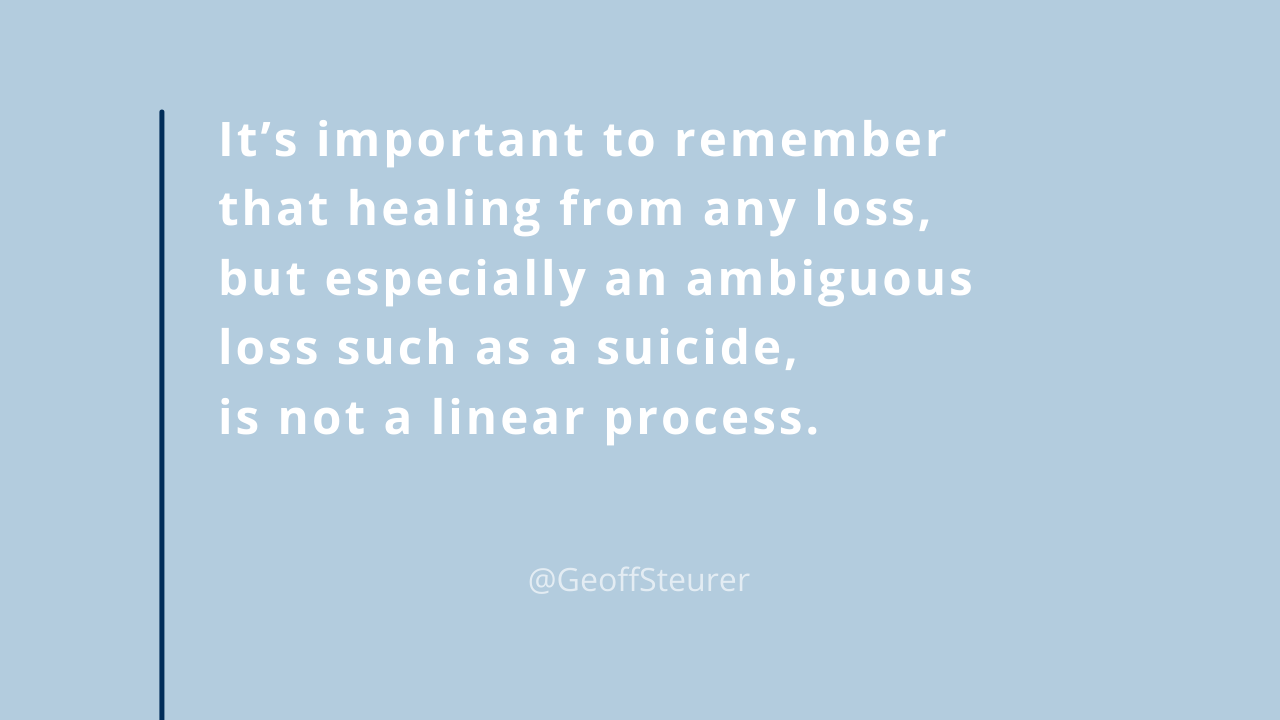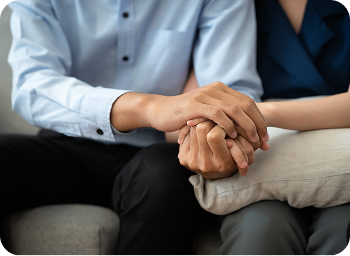
Q&A with Geoff: How do we heal after our daughter’s suicide?
Question
My husband had a daughter with his first wife, who he didn’t get to see him much when she was a child except for holidays and a month during the summer. As an adult she was a successful professional and was responsible in virtually every area of her life. We saw her less often due to distance but found out she was in a troubled relationship and very isolated socially. When the stress in this relationship got worse, she became more depressed.
She ultimately took her life, even though her dad moved to be with her for the last three months of her life to help support and encourage her. This was devastating because she was with her dad when she took her life.
We are doing much better now than we were a few years ago when it happened, but I now feel compelled to be a support to people with anxiety.
This would be okay if we didn’t have so many of these people in our life. I am scared about what might happen if we don’t support people enough. If they take their life, I’ll be a wreck. Moving forward with life my husband continues to live in the past and lament over his devastating loss. In my heart, I wish he was more present, but is this realistic?
Can you give us helpful suggestions in our path to recovery? I thought we were doing okay but recently realized we are still a bit of a mess.
Answer
I’m deeply sorry to hear of your loss, especially when your husband sensed something was seriously wrong and took action to support her more directly. This can create feelings of powerlessness that are hard to heal. Even though it’s been years since her passing, it’s common for the residual feelings of sadness, guilt and anxiety to linger.
Let’s talk about how you can find peace, so you aren’t held hostage by the paralyzing fear of this happening to someone else in your care.
It’s important to remember that healing from any loss, but especially an ambiguous loss such as a suicide, is not a linear process. It’s common to believe that each day will feel a little better than the previous, culminating in a permanent state of resolution and peace. In reality, the process of grieving is completely unpredictable and full of heart wrenching sadness coupled with surprisingly joyful moments.
This is both good news and bad news. The good news is that you’ll be surprised by joy, laughter and peace when you least expect it. The bad news is that you’ll never know when the emotional bottom falls out and you’re overcome with sadness.
Because the emotional pain of grief and loss is so difficult, it’s common to brace ourselves for the next wave of overwhelming emotions. This can lead to living a life of restricted emotion where we don’t allow ourselves to feel anything too deeply, thus preventing another devastating blow of grief. As Brene Brown teaches, “We cannot selectively numb emotion,” deciding which ones we’ll feel and which ones we’ll bypass.
Emotions are powerful and can leave us feeling so vulnerable and more powerlessness. However, if you pay close attention, you’ll likely notice that your emotions facilitate deeper connection with your late stepdaughter, your husband, family and God.
You also mention how stressful it is to support others who experience depression and anxiety, fearing they will take their own lives. This fear makes complete sense based on what you’ve personally experienced. Losing a loved one to suicide leaves loved ones asking questions to which there are often no answers in this life.
We want to know what else we could have done and replay the days and weeks leading up to their death to see if we somehow could have prevented it. We want the world to be ordered and make sense. We want to know that our efforts make a difference.
The struggling people in your life are fortunate to have your care and concern. The depth of compassion, understanding and experience you bring them is truly a gift. I personally know this feeling of responsibility in serving those who are emotionally fragile and uncertain about their own lives. I’ve sat with certain clients, friends and family members over the past 20-plus years, hoping they would choose life and living.
In these moments, it’s been a wrestle to clarify what is my responsibility and what is theirs. I found the greatest peace in accepting the truth that my presence and love is my gift to them. They have to be in charge of their own life and decide whether they keep living.
When you can stay with these dear people in their moment of need and not allow the fear of their future emotionally paralyze you, both of you will experience greater connection and peace. You and your husband have experienced one of life’s greatest challenges. Traumas like this will cause you to second-guess your natural instincts to feel, help, counsel and experience the richness of living among fellow travelers.
I hope you can allow yourself to feel the full measure of joy and sorrow as you heal and extend healing to others.



